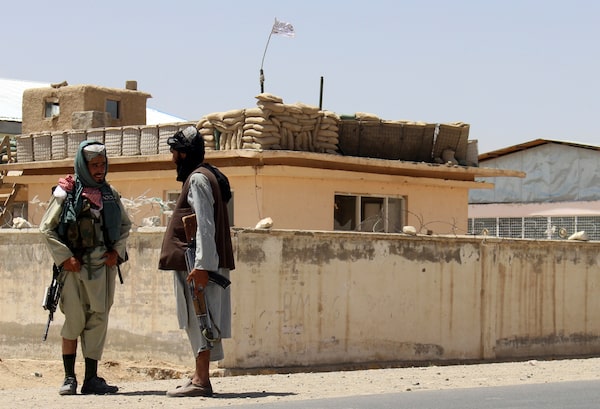
The manner of the American retreat makes the Canadian war effort in Afghanistan – 13 years and the lives of 158 members of the armed forces – seem all the more pointless, as Canadian veterans are now saying.Gulabuddin Amiri/The Associated Press
In the wake of America’s evacuation of Afghanistan, two past observations by Canadian leaders come to mind.
“We’re not going to win this war just by staying,” then-prime minister Stephen Harper told U.S. journalist Fareed Zakaria in a 2009 interview. “In fact, my own judgment, quite frankly, is that we are not going to ever defeat the insurgency.”
As is clear now, Mr. Harper got it right. His military had been telling him different rosy tales about how the Taliban insurgency was being defeated. But after three years as prime minister he saw the futility of the mission and prepared to get out.
In 2017, then-foreign minister Chrystia Freeland raised alarms with her declaration that the United States was “shrugging off the burden of world leadership.” This, she said, “puts into sharper focus the need for the rest of us to set our own clear and sovereign course.”
That was when Donald Trump was president, but Joe Biden’s utterly humiliating Afghanistan surrender has allies wondering if indeed the American era of global leadership is closing.
But is too much being made of the capitulation? With time the perspective could change.
The Taliban were very likely to have taken over the running of the country within a few months anyway. Mr. Trump’s withdrawal plan, followed upon by Mr. Biden, pretty well set the stage for that. Where was the hysteria then?
By contrast there was widespread support for the view that 20 years of warring in that troubled land was enough, that the fight was unwinnable.
The sight, however, of the most powerful military in the world succumbing like kittens to ragtag jihadis has the look of a historic shaming.
What will the Taliban’s return to power in Afghanistan mean for global terrorism?
In 1988, when the Soviets started to withdraw from Afghanistan following their failure there, it was done in an orderly, drawn-out way (I was this paper’s Moscow correspondent at the time).
The manner of the American retreat makes the Canadian war effort in Afghanistan – 13 years and the lives of 158 members of the armed forces – seem all the more pointless, as Canadian veterans are now saying.
A consequence will be a heavy reluctance by Canada and other allies to follow the Americans onto the battlefields. They’ve fallen in Vietnam, in Iraq and now Afghanistan. Three for three.
Canada wisely steered clear of Vietnam and the most recent Iraq conflict because our leaders could see the fault lines. On Afghanistan, there was no real choice given that everyone had to do their part in responding to 9/11. But choice came with the decision by the Liberals on the advice of military commander Rick Hillier to expand our war role by moving forces to the deadly area of Kandahar, this while the Americans channelled their resources into Iraq.
Here we fell into the trap of American political leaders who habitually put too much faith in the word of the military, give too much credence to the intelligence gathering of the CIA and naively hold to the belief that traditional tribal societies can be turned into Jeffersonian democracies.
They made these same mistakes time and time again. They learned little from history.
Barack Obama, as president, was skeptical of victory in Afghanistan but got pressured by the generals and agreed to a surge, which didn’t work. As is patently clear in his memoir, A Promised Land, then vice-president Mr. Biden was highly suspicious of what the Pentagon was peddling – he’d witnessed the Bay of Pigs fiasco, Vietnam, the weapons of mass destruction baloney – but was in the minority.
Reports differ on the quality of intelligence Mr. Biden received on the comparative strength of the Taliban and the Afghan military. NATO allies are alarmed at his show of ineptitude but he is unrepentant.
He may be able to gain back some of his standing if the Taliban hold to their promises of a peaceful transition and amnesty for opponents. If not, if they set about oppression and terrorist plotting, he has enormous air power at his disposal, which he is vowing to use.
His botching of the Afghan exit comes on top of other U.S. actions injurious to Canadian interests: on China, on pipelines, on the border opening.
Good personal relations between Mr. Biden and Justin Trudeau are of little value, former Washington ambassador David MacNaughton told me last week. It was time, he said, that Ottawa considered retaliation, especially if protectionist economic measures are imposed.
“We might have to look to actions that cause them political pain,” he said. He was echoing Ms. Freeland on the need for “our own clear and sovereign course.” The Afghan debacle unfolded a couple of days after he spoke.
Keep your Opinions sharp and informed. Get the Opinion newsletter. Sign up today.
 Lawrence Martin
Lawrence Martin